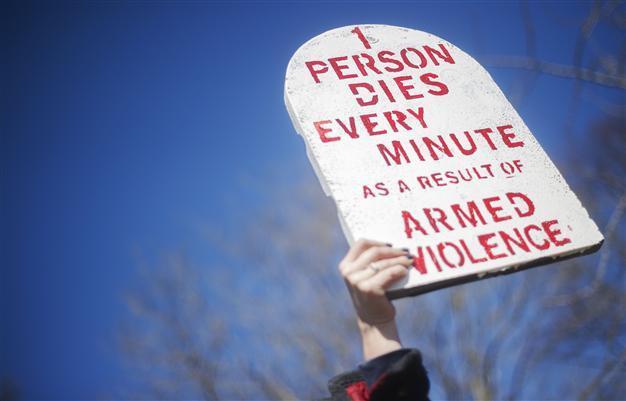UN General Assembly overwhelmingly adopts first-ever arms trade treaty
UNITED NATIONS - Agence France-Presse

A demonstrator from Amnesty International holds up a placard outside the White House in Washington, DC, March 22, as they protest calling for strong support for a comprehensive global Arms Trade Treaty. The UN General Assembly voted 154-3 for a resolution that will open the treaty for signature from June. AFP photo
The United Nations General Assembly on April 2 passed the first-ever treaty regulating the global conventional weapons trade in an attempt to bring transparency and protection of human rights to the often murky industry.
Only Syria, North Korea and Iran -- which had blocked the treaty last week -- voted against. Russia, one of the world's most prolific exporters of conventional weapons, was among the 23 countries abstaining.
The first major arms accord since the 1996 Comprehensive Nuclear Test Ban Treaty would cover the estimated $80-billion-a-year trade in tanks, armored combat vehicles, large-caliber artillery, combat aircraft, attack helicopters, warships, missiles and missile launchers, as well as small arms.
The treaty has no automatic enforcement. However, it seeks to force the weapons industry within accepted boundaries.
Control on exportsCountries abiding by the treaty would establish national controls on arms exports. They'd also have to be sure that weapons being exported would not be used in genocide, war crimes, or by terrorists or organized crime.
The UN assembly voted by an overwhelming 154-3 margin for the resolution. Individual nations can start ratifying from June and once the 50th country ratifies, the treaty takes effect.
In Britain, Prime Minister David Cameron called it a "landmark agreement that will save lives and ease the immense human suffering caused by armed conflict around the world." The British leader said the treaty will "reduce the number of illegal arms and make it harder for these to reach the hands of criminals and terrorists." However, the Conflict Awareness Project, a non-governmental research organization, said the treaty left a huge loophole by not directly addressing the role of middlemen in arms dealing networks.
"Since the broker is the central actor using the cover of legitimate business to divert weapons into the illicit trade, of all actors, this is the one requiring the strictest regulation," CAP's executive director Kathi Lynn Austin said.
"States that are serious about impeding illicit arms trafficking and protecting the legitimate trade in arms should implement a mandatory licensing and registration regime for all arms brokers," she said.
"Until then, these middlemen remain comfortably assured of conducting their lethal business as usual." There was especially strong support during 10 days of arduous negotiations at the United Nations from African and Latin American states that for decades have been among the prime markets for weapons exports.
The United States -- the world's biggest arms dealer -- signed on, but ratification by Congress is not assured.
Russia has said there are "omissions" in the treaty and "doubtful" provisions, such as the failure to control arms transfers to non-state groups.
Russia said it is worried about weapons getting into the hands of Chechen rebels, although for two decades the main sources of new weaponry in the tiny Caucasian province have included corrupt Russian suppliers and even military personnel.
